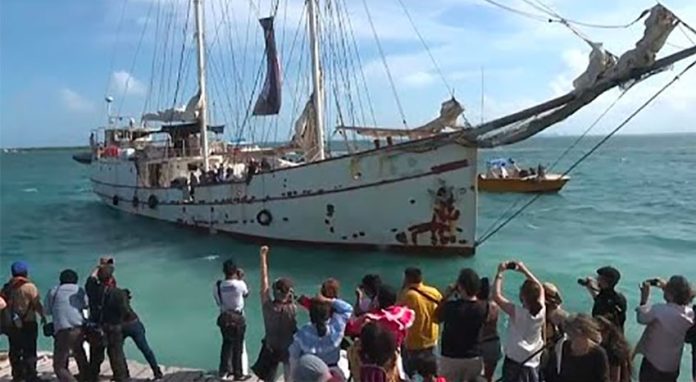The president has ordered officials to address passport applications by members of the Zapatista Army of National Liberation (EZLN) needed to travel to Spain.
A delegation from the group best known for staging an uprising in Chiapas in 1994, set sail for Europe early last month to coincide with the 500th anniversary of the fall of the Aztec capital of Tenochtitlán.
Other members were set to follow them by air, but have run into problems obtaining passports. The group’s former leader, Subcomandante Galeano, said officials had told some members that they lack the requisite documents.
The president addressed the issue in Tuesday’s morning press conference. “I have already given instructions to the Foreign Ministry to check why they were not given their passports,” he said. “Nobody should be limited, much less our brothers, indigenous comrades, to be able to leave the country,” he added.
EZLN spokesman Subcomandante Moisés has called the trip an “invasion,” alluding to the voyage made by Spanish conquerors to Mexico more than half a millennium ago, but has insisted the 21st century conquest differs in its aims: “This is a journey for life,” he said.
The seven-strong seafaring delegation departed from Isla Mujeres, Quintana Roo, on May 2, aboard an old German sailboat. It has already arrived at Portugal’s Azores islands in the remote Atlantic, and will continue to continental Europe, planning to land at Vigo, Spain, before traveling to Madrid for August 13: the date on which the Aztec capital fell.
The EZLN has accepted invitations to meet with NGOs and other groups in 30 European countries and territories, according to Moisés, among which are Germany, Denmark, Hungary, Italy, the United Kingdom, Cyprus, Sardinia, Catalonia, France, Russia and Poland.
The group has stated it will not request an apology from Spain for historic bloodshed, maintaining that they were never conquered, and continue to resist colonial repression.
The EZLN rose to prominence when it staged an uprising in Chiapas on January 1, 1994 in opposition to the North American Free Trade Agreement. The group still controls and governs large swathes of the state of Chiapas in caracoles, or autonomous zones, where government aid is refused.
